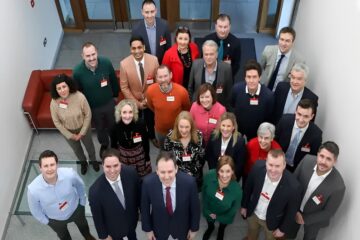The National Parks and Wildlife Service of the Department of Housing, Local Government and Heritage, and the Department of Agriculture, Food and the Marine have published a report exploring the need for increased pan European collaboration on peatlands restoration, conservation and sustainable management. The report summarises the findings of an exploratory study to discover how a European network could help overcome action and policy barriers for peatlands.
The exploratory study, supported by the United Nations Environment Programme’s Global Peatlands Initiative, built on momentum from the UN Climate Climate Change Conference (COP26) and responded to the call-to-action to deep-dive into whether a government-supported network could make a real difference for peatlands and to advance the discussions between ministers and experts.
Peatlands are carbon storage powerhouses, biodiversity champions, and important for climate change adaptation and mitigation. Damaged peatlands however become significant sources of carbon emissions. Although only 15% of the world’s peatlands have been degraded, this 3% of the world’s surface area contributes to more than 5% of human-caused CO2 emissions.
Ireland’s peatlands comprising of raised bog, blanket bogs and fens, are unique on a global and European scale with Ireland holding over 50% of the total habitat resource of raised bog and 99.9 % of that of blanket bog, within the EU Atlantic Biogeographic Zone.
By rewetting and restoring peatlands they can be transformed from a carbon emission source into a healthy carbon sink, while maintaining their rich heritage beneath.
The National Parks and Wildlife Service in Ireland is undertaking a significant programme of peatland restoration for protected raised bog Special Areas for Conservation and Natural Heritage Area across the country. In tandem with this, NPWS is leading the LIFE Integrated Project Wild Atlantic Nature project has a special focus on blanket bog across an area of over 250,000ha of ecologically and socially important habitats, stretching along the west coast of Ireland from south Galway to north Donegal.
The European Peatlands Initiative exploratory study involved over 150 stakeholders from the peatlands sector across Ireland and Europe. The aim of the study was to discover the key needs of Europe’s peatlands and to investigate if there were potential benefits that could accrue from cross- country collaboration on peatlands management.
It has been made clear from the study results that to reverse the loss of peatlands across Europe, and to ensure that they are conserved, restored and sustainably managed, all stakeholders must come together to accelerate action. Many of the participants agreed that in the midst of a global climate and biodiversity crisis collaborative action is vital and can help achieve the COP21 Paris Climate Change Agreement targets.
Welcoming the report, Minister of State for Heritage and Electoral Reform, Malcolm Noonan, said, “by sharing all of our work and experience on peatlands, through different forums with the scientific community, existing peatland projects, institutions, governments, landowners and communities across Europe we can enhance the interfaces between science, policy and practice and move towards a positive outcome for peatlands across the continent.”
“COP 26 energised countries and organisations and many countries demonstrated unity in taking the next steps in this important discussion on how we can meaningfully collaborate across Europe in order to maximise the positive outcomes for all our peatlands managements programmes. I am delighted that Ireland can play its part in exploring this possibility further together with the many organisations and stakeholders that are passionate about peatlands. We hope this momentum can continue at COP27. With so many challenges surrounding good peatland conservation it is important that Ireland and our European and global partners, build on the current exchanges of knowledge and expertise in this field.”
Minister of State for Land Use and Biodiversity at the Department of Agriculture, Senator Pippa Hackett, said, “the report provides insights into the challenges currently facing European peatlands and the key needs that could be addressed by a European Peatlands Initiative. It explores the potential benefits of a government-supported network that could, amongst other things, drive knowledge exchange on all levels in order to accelerate action on peatlands and help to identify and help unlock large-scale funding.”



